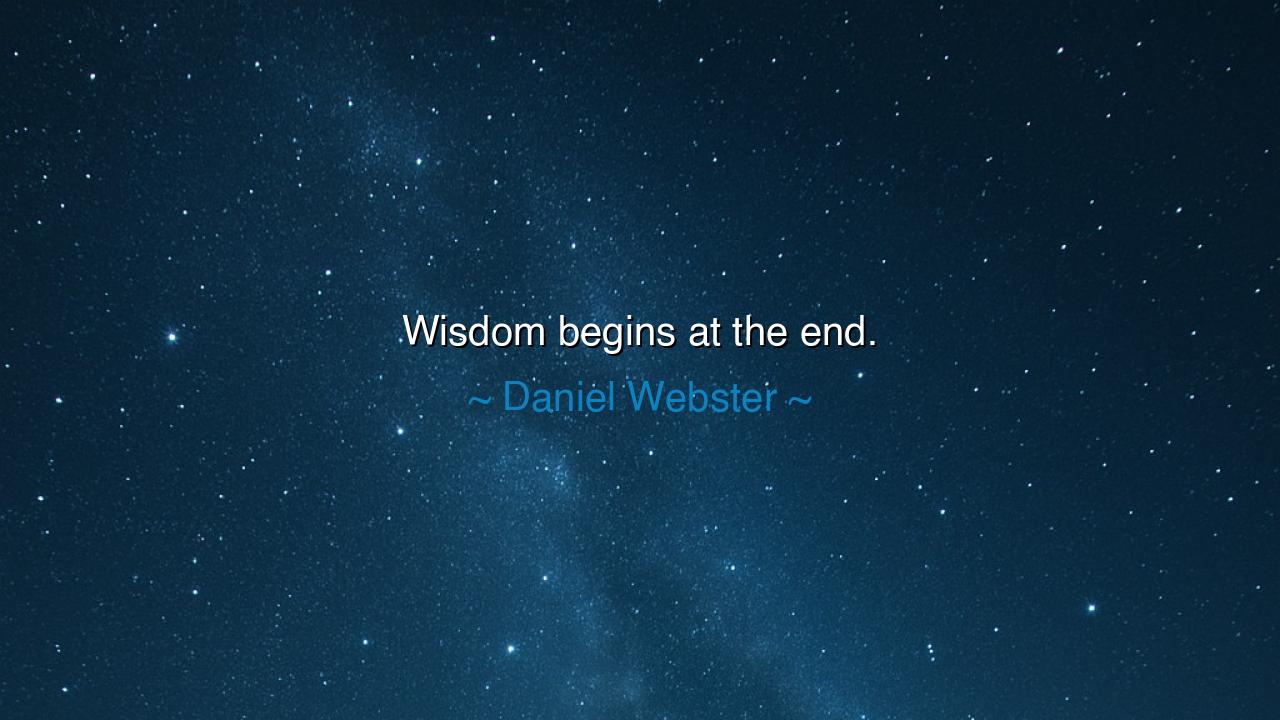
Wisdom begins at the end.






"Wisdom begins at the end." Thus spoke Daniel Webster, orator of a young America, whose words strike with the weight of finality. His meaning is both solemn and clear: that men do not learn in the beginning of their journey, but at its close. When all choices have been made, when consequences are revealed, and when the veil is lifted from folly, then at last comes wisdom. It is the fruit that ripens not in the spring of action, but in the autumn of reckoning.
The ancients proclaimed this same truth. In the tragedies of Aeschylus and Sophocles, heroes acted in blindness, driven by pride, wrath, or desire. Only when ruin came—when kingdoms crumbled and lives were lost—did they finally understand. Thus Oedipus, only at the end, found the bitter wisdom of his fate. Life itself was their teacher, and the tuition was suffering.
History, too, bears witness. Napoleon, in the splendor of his early victories, believed himself invincible. But only at Waterloo, when the eagles of France lay broken upon the field, did he grasp the limits of ambition. His wisdom began not in triumph, but at the end, when defeat stripped away illusion and left only truth.
So too in the life of Abraham Lincoln. In his early years, he stumbled through failures in business, law, and politics. Yet each fall brought lessons he could not have learned otherwise. By the time he bore the crushing weight of civil war, he carried within him a deep wisdom—but that wisdom was born of ends, of losses, of reckonings. Without those endings, he could never have endured the trial of preserving the Union.
Therefore, let this lesson be carried forward: do not despise endings, for they are the birthplace of wisdom. Beginnings are bright but blind; only the close of things reveals their true shape. At the end of struggle, at the end of pride, at the end of error, the light dawns. Remember Webster’s counsel: the crown of wisdom is not given at the start of the race, but at its finish, when the journey has taught the soul what nothing else could.






GL12A7-20-Le Gia Linh
I have to admit, I find this quote a bit unsettling. If wisdom only begins at the end, does that mean we never fully understand the lessons while we're living them? I sometimes feel that learning through experience is a constant process, not something that suddenly hits us when we’re done with something. Is there a way to balance living in the moment with gaining wisdom during the journey, rather than just at its conclusion?
TTthang tran
Isn't it kind of frustrating that wisdom is something we often only recognize after we've gone through the hardship or challenge? It’s as though we don’t have the tools to grasp it while we’re in the thick of things. I’d be curious to know whether it's possible to tap into wisdom during a journey, or if it really only makes sense when you can look back. Do we need distance from events to gain that insight?
HNHang Nguyet
This quote makes me think about life and how we often don't realize the importance of certain experiences until they're over. It feels like wisdom isn't just about knowledge, but more about understanding the significance of what we've been through. But how can we truly appreciate the lessons of the past if we don't have the clarity or time to reflect on them in the moment? Do we need to reach a certain stage in life to truly understand?
TTho thi thanh thuyen
I wonder if this quote means that wisdom comes only after we've gone through all the experiences and made all the mistakes. Is it possible to have wisdom before reaching the end of something, or is it always tied to reflection on past events? It's a bit daunting to think that wisdom is something we can only access after everything is over, as if there’s no way to prepare for the big lessons while we're still in the process of learning.